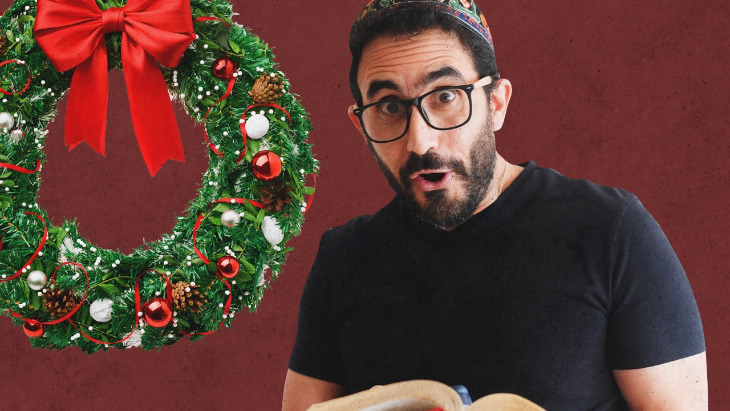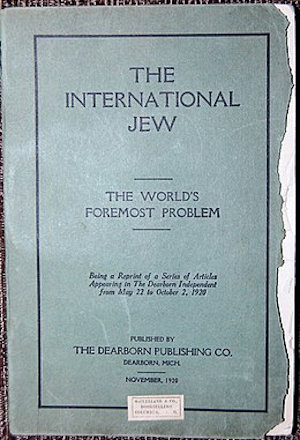 Iran’s Attack on Israel
Iran’s Attack on Israel


10 min read
A historical look of Jews and Christmas and the surprising origins of the greeting “Merry Christmas.”
‘Tis the season for the ongoing debate over what constitutes the most appropriate season’s greeting. In an effort to be more inclusive, many businesses in recent decades have instructed their employees to greet patrons with “Happy Holidays.” The ACLU, and the like, have brought numerous court cases to keep references and symbols of Christmas out of public schools and government buildings1.
On the other hand, there are those who believe America was founded as a Christian country, and Christmas was proclaimed as one of the first four federal holidays in 1870.2 So best to just leave it alone.
The origins of the greeting “Merry Christmas” are actually rather surprising.
Dr. Steven Nissenbaum, in his book The Battle for Christmas, explains that the Puritans, protestant English reformists and the first Europeans to settle in the New World, sought to outlaw the holiday of Christmas altogether in their new home, after having done so in England. There were two global problems that they saw in the institution of the holiday. First of all, the Puritans strived for “biblical authenticity”, so they took issue with the dating of the nativity on December 25. Their position was that if their deity wanted them to know the birthday of Jesus, it would have been recorded in scripture.
Furthermore, the details given in the Christian bible of the nativity are more of a springtime description than of one in early winter in the land of Israel. The narrative takes place in a time when shepherds were sleeping in the fields with their flock.3 While such behavior was common during warmer months, in the mild winters of ancient Judea, shepherds would bring their flocks indoors.
The association of Jesus’s birth with this time of year happened during the 3rd and 4th centuries long after the Christian scripture were published and circulated4. The main motive of establishing a date for the nativity was to quell theories that Jesus never existed as human, but rather as a spirit. What could be more mortal than having a birthday?
There are a number of theories as to why December 25 (or January 6 after the Gregorian correction in 1582) was chosen. One theory put forth by Nissenbaum is that Rome became Christian in the 4th century under the rule of Constantine the Great. At that time, there was an active attempt to convert the masses by incorporating familiar Pagan customs into Christianity.5 Since the winter solstice was observed in Rome as the holiday of Saturnalia, a week-long holiday dedicated to food, drink, and revelry, it was an ideal time of the year to celebrate the newly established Christmas festivity.
Since the winter solstice was observed in Rome as the holiday of Saturnalia, a week-long holiday dedicated to food, drink, and revelry, it was an ideal time of the year to celebrate the newly established Christmas festivity.
Nissenbaum writes: “In return for ensuring massive observance of the anniversary of the Savior’s birth by assigning it to this resonant date, the Church for its part tacitly agreed to allow the holiday to be celebrated more or less the way it had always been.” In Rome, the licentious and pagan observance of Saturnalia remained. The name was just changed to “Christmas,” and the populace was told that the holiday was now in celebration of Jesus’s birth.
This brings us to the second major issue the Puritans had with the holiday. From the postclassical through the early modern eras in much of the world, Christmas was celebrated by drinking, sexual indulgence, singing naked in the streets (a precursor of modern caroling), etc. In the words of Cotton Mather, a Massachusetts Puritan Minister best known for his role in the Salem Witch Trials of 1692, “The Feast of Christ’s Nativity is spent in Reveling, Dicing, Carding, Masking, and in all Licentious Liberty. Men dishonor Christ more in the twelve days of Christmas than in all the twelve months besides.”6
It is from this description of the day that Nissenbaum posits the phrase “Merry Christmas” evolved. “’Merry’ refers not to Mary but to mirth, and when the term first became linked with Christmas, its connotations were anything but holy. That linkage took hold during the Elizabethan period -- a time and place we still think of as Merry England. Before that period, the word ‘merry’ sometimes meant cheerful, but by the late 1500s it had come to suggest behavior that was cheerfully boisterous, ‘mirth’ especially associated with the effects of alcohol or even uninhibited sexuality.7”
“Merry”, in old English implies drunkenness, lewdness, and sexual immorality.
“Merry”, in old English implies drunkenness, lewdness, and sexual immorality.8 In the new world, local papers riled against the greeting: “So merry at Christmas are some, they destroy their health by disease, and by trouble their joy.”9 So while the greeting has been rehabilitated in more recent times, its origins are far from favorable.
With this picture of the origins of Christmas, we can understand a Jewish custom in association with the day. The custom is referred to as Nittel Nacht. It is strictly Eastern European Ashkenazi in origin and is preserved and followed until this day in many Chassidic communities.
What does the name actually mean? Rabbi Yisroel Isserlin (1390-1460) is one of the earliest commentators to use the phrase “Nittel'' in reference to Christmas. His spelling in Hebrew of the word is a variation of the word “nitleh” – meaning the one who was hung (or crucified).10 Nacht is the Yiddish word for Night. So Nittel Nacht means the “Night of the Hung One.”
Nittel Nacht means the “Night of the Hung One.”
The custom of Ashkenazi Jews was not to study Torah on Nittel Nacht. While there is a multitude of explanations given for this custom, one fits very much with our discussion here. The custom rose out of fear of the wrath of their non-Jewish neighbors.11 You can imagine what would happen if a group of marauding, drunk, licentious seeking Christians stumbled past a packed Jewish study hall on the night of Christmas Eve. Unfortunately, there are many such cases recorded in history as to what resulted from this unfortunate mix.
The fear amongst the Jewish community of Eastern Europe is palpable in this letter to the editor from a Vilna newspaper in 1882:
“… we expected a pogrom during the Christmas holidays and the city was in a state of siege… What kind of life is this? If I had the courage I would kill all those close to me and then myself, and the farce would be over. If I do not, some drunken riffraff will come along, ravish my wife and daughter and throw my infant from the third-floor window…. What a miserable creature is the Jew!12”
Antisemitic activities were often institutionalized on the holiday. In 1466, Pope Paul II revived and revamped a Saturnalia custom for Christmas by forcing Jews to race naked for the amusement of the Roman Catholic citizens. The race was performed while the Romans taunted and the “Holy Father stood upon a richly ornamented balcony and laughed heartily.”13
Antisemitic activities were often institutionalized on Christmas.
In 1881, the Jewish community of Warsaw was blamed for a stampede caused by someone yelling “fire” in a crowded church. A three-day pogrom ensued that left two dead and 24 injured.14
A related story is told of Rabbi Shmuel Eidels (1555-1631) known as the Maharsha who would review his finances on the night of December 24 in observance of Nittel, and make an accounting of what he would give to charity. One year someone "reported" the great rabbi to the police saying that in hatred of the Christians he wouldn't study his Torah on their holiday. The police decided to investigate this complaint. That night, as the Maharsha was sitting and reviewing his accounts, a Torah text fell from his bookshelf. He picked it up, opened it, and began to leaf through. As the Maharsha became engrossed in the Torah ideas, the police burst into his home as part of their "investigation." Needless to say, there was now no case against him.15
Christmas antisemitism would find its way into 20th century America. “Last Christmas most people had a hard time finding Christmas cards that indicated in any way that Christmas commemorated Someone’s Birth,” wrote Henry Ford.16 The revolutionary automobile mogul associated with his goal of “democratizing the automobile,” was well known for his hatred of our people. He was the publisher in the US of the antisemite’s bible “The Protocols of the Elders of Zion” and distributed it through his auto dealerships inciting Jew-hatred.
In 1921, Ford lobbied his case against American Jewry in a series of pamphlets known collectively as The International Jew: The World’s Foremost Problem, accusing Jews of conspiring to “abolish” Christmas celebrations in public, among a myriad of other crimes.

Ford wrote: “Not only do the Jews disagree with Christian teaching – which is their perfect right, and no one dare question it – but they seek to interfere with it. It is not religious tolerance in the midst of religious differences, but religious attacks that they preach and practice. The whole record of Jewish opposition to Christmas, Easter, and certain patriotic songs shows that.”
These rants were sparked by a handful of Jewish leaders lobbying for the removal of religious references from the public school. For example, in 1912 a school board in Massachusetts was asked to remove references to Jesus from the Christmas program (they did not ask for the suspension of the program).
In his pamphlets, Ford accused Jewish businessmen of being two-faced, “profiteering” from Christmas sales while working to remove the religion from the holiday.
The relationship of the Jewish community to Christmas throughout history has been anything but merry. I’m sticking with “Happy Holidays.”
Read more about Jews and Christmas.

The derivation of nitl from נתלה sounds forced. In Portuguese, X-mas is called Natal, from Latin, natalis, meaning birth. So nitl nacht = the night of the birth.... Seems more likely!